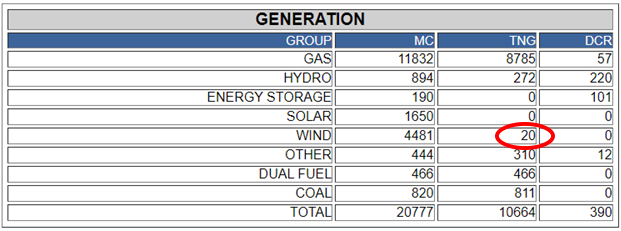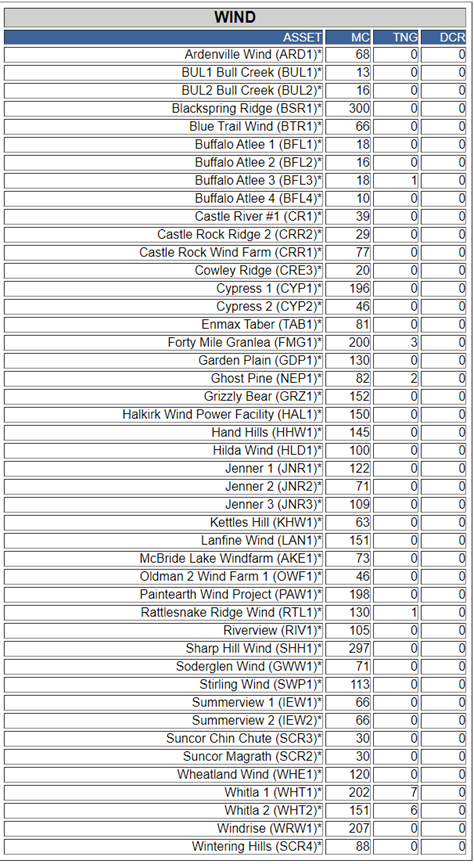Brian Zinchuk is editor and owner of Pipeline Online

Wind turbines near Pincher Creek, Alberta, on Dec. 1, 2023 Photo by Brian Zinchuk
Wind power generation in Alberta fell to less than one half of one per cent of installed capacity at 8:42 p.m. on Sunday, Jan. 7. And since it was dark out, solar was producing zero power as well.
Just 20 megawatts were produced by the 45 wind farms in Alberta at that time. That data is according to the Alberta Electric System Operator (AESO), which provides minute-by-minute data on the province’s open market electrical grid at this site. Out of the 4,481 megawatts of wind generation, those 20 megawatts was just 0.4 per cent of nameplate capacity. And it persisted around 25 megawatts for at least two hours. Three hours later, wind was around 80 megawatts.

Power generation, in megawatts, in Alberta at 8:42 p.m., Sunday, Jan. 7, 2024. MC is maximum capacity, TNG is total net to grid, and DCR is dispatched and accepted contingency reserve. Alberta Electric System Operator.
That meant out of a combined capacity of 6,131 megawatts of grid-scale wind and solar in Alberta, the province was getting only 20 megawatts, or 0.3 per cent.
At the time, it was -17 C in Calgary, -15 C in Edmonton, -20 C in Fort McMurray, and -24 C in Grande Prairie, according to Environment and Climate Change Canada.
- 0113 Miller Epic Cinematic Hollywood trailer0113 Miller Epic Cinematic Hollywood trailer
- 0112 SASPO-2896_Right of Way_Awareness_20250112 SASPO-2896_Right of Way_Awareness_2025
- 0111 2026 SK Oil Show booth promo 010111 2026 SK Oil Show booth promo 01
- 0085 Turnbull snow removal call office0085 Turnbull snow removal call office
- 0110 SaskEnergy SEI_Network_Members_Burn_Brighter0110 SaskEnergy SEI_Network_Members_Burn_Brighter
- 0105 SaskEnergy Commitment to Safety0105 SaskEnergy Commitment to Safety
- 0102 Lori Carr Coal Extended0102 Lori Carr Coal Extended
- 0100 Turnbull Project Manager0100 Turnbull Project Manager
- 0099 Mryglod Steel 1080p0099 Mryglod Steel 1080p
- 0097 Eagle Sky Ventures LTD0097 Eagle Sky Ventures LTD
- 0095 Fast Trucking nearly 70 years good at it0095 Fast Trucking nearly 70 years good at it
- 0092 Turnbull projects big and small0092 Turnbull projects big and small
- 0046 City of Estevan This is Estevan Teaser0046 City of Estevan This is Estevan Teaser
- 0077 Caprice Resources Stand Up For Free Speech0077 Caprice Resources Stand Up For Free Speech
- 0061 SIMSA 2024 For Sask Buy Sask0061 SIMSA 2024 For Sask Buy Sask
- 0051 JML Hiring Pumpjack assembly0051 JML Hiring Pumpjack assembly
- 0049 Scotsburn Dental soft guitar0049 Scotsburn Dental soft guitar
- 0041 DEEP Since 2018 now we are going to build0041 DEEP Since 2018 now we are going to build
- 0032 IWS Summer hiring rock trailer music
- 0022 Grimes winter hiring
- 0021 OSY Rentals S8 Promo
- 0018 IWS Hiring Royal Summer
- 0013 Panther Drilling PO ad 03 top drive rigs
- 0002 gilliss casing services0002 gilliss casing services
- 9002 Pipeline Online 30 sec EBEX9002 Pipeline Online 30 sec EBEX
- 9001
And at the same time, the last two coal units, located at the Genessee Generating Station, were producing 811 megawatts out of a capacity of 820 megawatts. That’s 99 per cent output.
And that one coal plant was producing 40 times the output of the 45 wind farms comprised of hundreds of wind turbines and having cost billions of dollars. It is expected to be shut down and converted to natural gas in the coming months, meaning Alberta will be entirely out of coal-fired power generation at that time.

Wind power generation, in megawatts, in Alberta at 8:42 p.m., Sunday, Jan. 7, 2024. Only six of 45 wind farms were producing any power whatsoever. Even mammoth farms in the 300 megawatt range, like Blackspring Ridge and Sharp Hill Wind were completely flatlined. MC is maximum capacity, TNG is total net to grid, and DCR is dispatched and accepted contingency reserve. Alberta Electric System Operator.
And of the 45 wind farms, only six were producing any power whatsoever. The remaining 39 produced zero power to the grid at that time, with zeros across board for them. Similarly, the 43 solar farms were producing zero power at the time, meaning that out of 88 solar and wind facilities, only six were producing power during that time.
When wind bottomed out, the 10 grid scale batteries in Alberta were not providing any power to the grid, according to website Dispatcho.app, which provides minute-by-minute logs of the entire Alberta electrical grid as provided by the AESO. However, a little earlier in the evening, three of those batteries did, indeed provide a minimal amount of power. Each of those three has a capacity of 20 megawatts, but none of them output nearly that much. From 6:02 to 6:56, eReserve 7 provided five megawatts, 6:01 to 6:55, eReserve 8 provided 5 megawatts, and from 6:00 p.m. to 6:57, eReserve 9 produced 5 megawatts. This appears to be in keeping with the typical usage of these units, as observed over many months by Pipeline Online. When they produce their full capacity of 20 megawatts each, it’s usually for only nine to 23 minutes at a time. In this case, they each provided about one quarter of their theoretical output, but for roughly three times as long as usual.
Saskatchewan
In Saskatchewan, wind power output was minimal, at best, from Jan. 2 to Jan. 6, with a period of zero wind power in Saskatchewan on Jan. 2. Pipeline Online has asked SaskPower for an update on the remaining days in that period. On Jan. 6, wind in Saskatchewan averaged just 47 megawatts out of 617, meaning natural gas and coal combined made up 88 per cent of power generation on that day, according to SaskPower.
Total demand averaged 3,231 megawatts over 24 hours and total generation was 3,331 megawatts, with 100 megawatts exported.
With SaskPower’s entire natural gas fleet, including peaking capacity, totaling 2,065 megawatts, natural gas was running at 84.8 per cent capacity, at 1,751 megawatts.
The 88 per cent of Saskatchewan’s power being provided by fossil fuels, natural gas and coal, is notable because the federal government wants all conventional coal (without carbon capture) gone by 2030, and unabated natural gas (again, without carbon capture) gone by 2035. That’s 25 years, 11 months and 23 days from now. In the meantime the proposed Clean Electricity Regulations envision multiplying the Canadian electrical grid by a factor of 2.5x by 2050, or 25 years, 11 months and 23 days from now, meaning not only must Saskatchewan replace nearly all of its existing power generation on days like Jan. 2, but multiply it by 2.5x in that time frame. Both Saskatchewan Premier Scott Moe and SaskPower CEO Rupen Pandya have said this would be “impossible.”
However, SaskPower intends on adding a further 3,000 megawatts of wind and solar to the grid by 2035. This is in keeping with the province’s commitments to the federal government to build out renewable power generation, part of an “equivalency agreement” to keep existing coal generation going longer than what was going to initially be allowed.
- 0113 Miller Epic Cinematic Hollywood trailer0113 Miller Epic Cinematic Hollywood trailer
- 0112 SASPO-2896_Right of Way_Awareness_20250112 SASPO-2896_Right of Way_Awareness_2025
- 0111 2026 SK Oil Show booth promo 010111 2026 SK Oil Show booth promo 01
- 0085 Turnbull snow removal call office0085 Turnbull snow removal call office
- 0110 SaskEnergy SEI_Network_Members_Burn_Brighter0110 SaskEnergy SEI_Network_Members_Burn_Brighter
- 0105 SaskEnergy Commitment to Safety0105 SaskEnergy Commitment to Safety
- 0102 Lori Carr Coal Extended0102 Lori Carr Coal Extended
- 0100 Turnbull Project Manager0100 Turnbull Project Manager
- 0099 Mryglod Steel 1080p0099 Mryglod Steel 1080p
- 0097 Eagle Sky Ventures LTD0097 Eagle Sky Ventures LTD
- 0095 Fast Trucking nearly 70 years good at it0095 Fast Trucking nearly 70 years good at it
- 0092 Turnbull projects big and small0092 Turnbull projects big and small
- 0046 City of Estevan This is Estevan Teaser0046 City of Estevan This is Estevan Teaser
- 0077 Caprice Resources Stand Up For Free Speech0077 Caprice Resources Stand Up For Free Speech
- 0061 SIMSA 2024 For Sask Buy Sask0061 SIMSA 2024 For Sask Buy Sask
- 0051 JML Hiring Pumpjack assembly0051 JML Hiring Pumpjack assembly
- 0049 Scotsburn Dental soft guitar0049 Scotsburn Dental soft guitar
- 0041 DEEP Since 2018 now we are going to build0041 DEEP Since 2018 now we are going to build
- 0032 IWS Summer hiring rock trailer music
- 0022 Grimes winter hiring
- 0021 OSY Rentals S8 Promo
- 0018 IWS Hiring Royal Summer
- 0013 Panther Drilling PO ad 03 top drive rigs
- 0002 gilliss casing services0002 gilliss casing services
- 9002 Pipeline Online 30 sec EBEX9002 Pipeline Online 30 sec EBEX
- 9001
